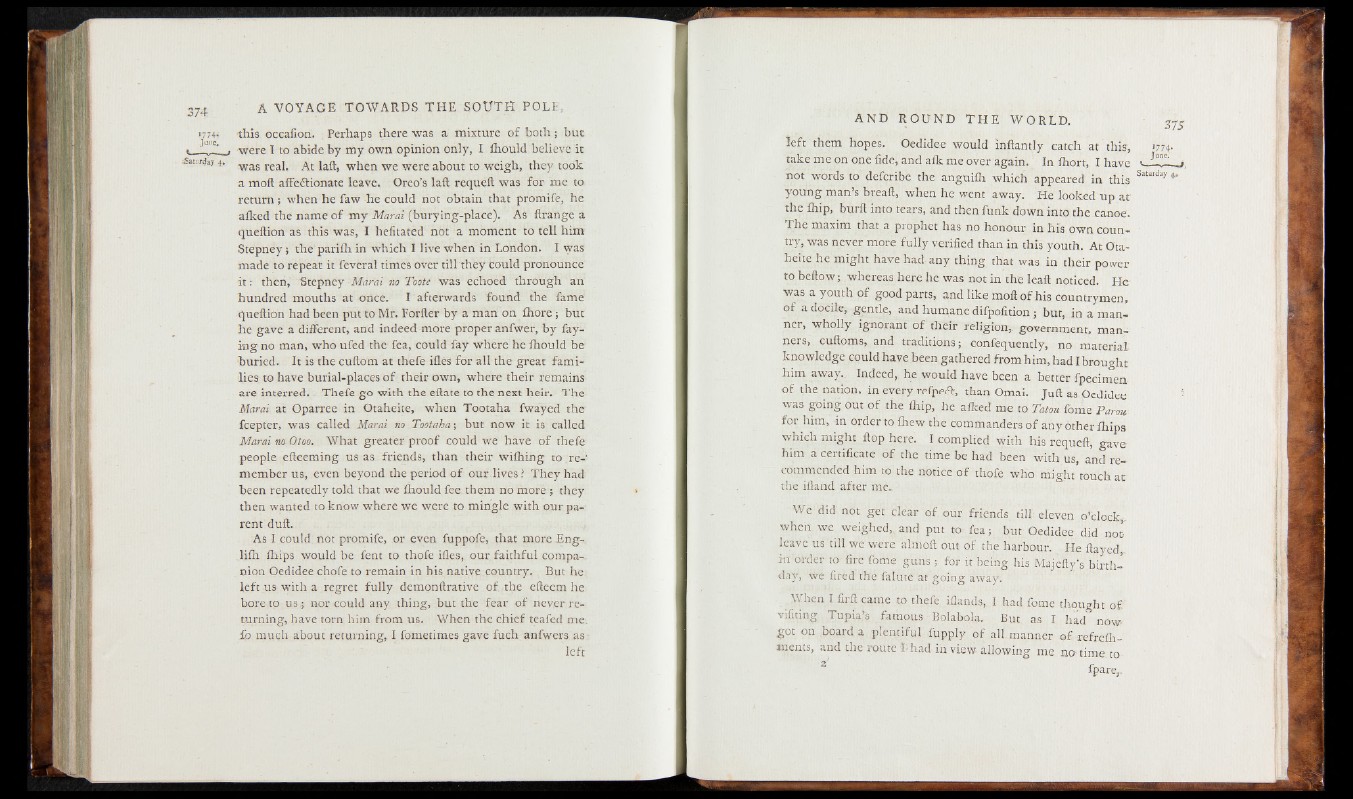
1774* this occafion. Perhaps there was a mixture of both ; but
. Jm'e' ■ were I to abide by my own opinion only, I fhould believe it
aanjay 4. was reag At laft, when we were about to weigh, they took
a moll affedtionate leave. Oreo’s laft requeft was for me to
return; when he faw he could not obtain that promife, he
afked the name of my Marai (burying-place). As ftrange a
queftion as this was, I hefitated not a moment to tell him
Stepney; the parifh in which I live when in London. I was
made to repeat it feveral times over till they Could pronounce
i t : then, Stepney Marai no Toote was echoed through an
hundred mouths at once. I afterwards found the fame
queftion had been put to Mr. Forfter by a man on fhore ; but
he gave a different, and indeed more proper anfwer, by faying
no man, who ufed the fea, could fay where he fhould be
buried. It is the cuftom at thefe ifles for all the great families
to have burial-places of their own, where their remains
are interred. Thefe go with the eftate to the next heir. The
Marai at Oparree in Otaheite, when Tootaha fwayed the
fcepter, was called Marai no Tootaha; but now it is called
Marai no Otoo. What greater proof could we have of thefe
people efteeming us as friends, than their wifhing to re-*
member us, even beyond the period of our lives ? They had
been repeatedly told that we fhould fee them no more ; they
then wanted to know where we were to mingle with our parent
duft.
As I could not promife, or even fuppofe, that more Eng-
lifh fhips would be fent to thofe ifles, our faithful companion
Oedidee chofe to remain in bis native country. . But he:
left us with a regret fully demonftrative of. the efteem he
bore to us ; nor could any thing, but the fear of never returning,
have torn him from us. When the chief teafed me.
ib much about returning, I fometimes gave fuch anfwers asleft
left them hopes. Oedidee would inftantly catch at this, '774-
take me on one fide, and afk me over again. In Ihort, I have
not words to defcribe the anguifih which appeared in this Satl,Klay4,
young man’s breaft, when he went away. He looked up at
the fhip, burft into tears, and then funk down into the canoe.
The maxim that a prophet has no honour in his own country,
was never more fully verified than in this youth. At Otaheite
he might have had any thing that was in their power
to beftow; whereas here he was not in the leaft noticed. He
was a youth of good parts, and like moftof his countrymen,
of a docile, gentle, and humane difpofition ; but, in a manner,
wholly ignorant of their religion, government, manners,
cufioms, and traditions; confequently, no material
knowledge eould have been gathered from him, had I brought
him away.. Indeed, he would have been a better fpecimen
of the nation, in every refpetft, than Omai. Juft as Oedidee
was going out of the fhip, he aiked me to Tatou fome Parou
for him, in order to fliew the commanders of any other fhips
which might flop here. I complied with his requeft, gave
him a certificate of the time be had been with us, and recommended
him to the notice of thofe who might touch at
the iiland after me..
We did not get clear of our friends till eleven o’clock,,
when we weighed, and put to fea; but Oedidee did not
leave us till we were almoft out of the harbour. He flayed,,
in order to fire fome guns ;. for it being his Majefty’s birthday,
we fired the falute at going away.
When I firft came to thefe iflands, I had fome thought of
vifiting Tupia’s famous-Bolabola. But as I had now-
got on board a plentiful fupply of all manner of refrefh-
inents, and the route I; had in view allowing me no'time to
fpare,.